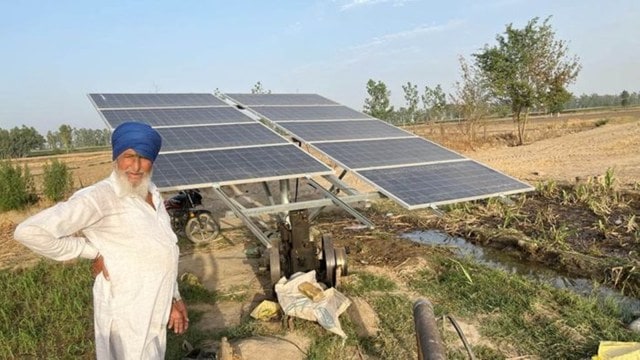Unchecked installation of solar-operated tube wells threatens Punjab’s water resources, crop diversification
Punjab farmers say they are being forced to turn to solar-operated tube wells for irrigation of water-intensive paddy cultivation after cotton crops suffered significant losses due to pest attacks.
 A farmer in Sultanpur Lodhi using a solar- operated tubewell.
(Photo by Rajiv Kumar, X@RajivKumar1)
A farmer in Sultanpur Lodhi using a solar- operated tubewell.
(Photo by Rajiv Kumar, X@RajivKumar1) Punjab has been witnessing a new trend of farmers installing solar-operated tube wells unchecked through private companies without following the proper route of securing permission from the government through an application.
This practice threatens the state’s groundwater reserves and agricultural diversification efforts. This issue is particularly rampant in Malwa districts such as Bathinda, Mansa, Barnala, Fazilka, and parts of Muktsar, where several of these tube wells have been installed within the last year. Driven by the desperation of farmers shifting from cotton to paddy cultivation, these tube wells operate outside of any state government policy.
Farmers using these pumps are saying that they are being compelled to switch to paddy, which requires extensive irrigation. This comes at a time when they are experiencing significant losses in the cotton crop year after year due to devastating attacks by pests like pink bollworm and white flies.
Officials in the agricultural department said the proliferation of privately installed tube wells requires comprehensive policies to regulate their installation and operation. Without effective management, Punjab risks further depletion of its precious groundwater resources, jeopardising the sustainability of agriculture in the region.
In Punjab, 117 out of 153 agricultural blocks have been categorised as over-exploited or critical. The over-exploited blocks are further divided into two categories. There are 63 ‘orange’ blocks, where groundwater development exceeds 200 per cent, requiring immediate conservation measures, and 53 ‘yellow’ blocks, where development ranges from 100 to 199 per cent, necessitating urgent management attention.
The remaining 37 blocks, including critical, semi-critical, and safe ones, are designated as ‘green”, requiring sustainable water management practices to maintain groundwater conditions.
Farmers crave guaranteed water supply, private players jump in
Under the current state policies, Punjab manages over 14 lakh power-run tube wells, 1.5 lakh diesel-run tube wells, and 17,422 government-subsidised solar pumps through the Punjab Energy Development Agency (PEDA), placing considerable strain on groundwater levels. Also, the Punjab government announced that it would give 90,000 solar pumps but only through proper surveys where the water level is not down and for the purpose of drip and sprinkler irrigation.
The recent surge in privately installed solar-operated tube wells aggravates this strain. While government regulations restrict new connections for power-run tube wells, which receive free power via rural feeders from the Punjab State Power Corporation Limited (PSPCL), PEDA’s solar pumps are installed under regulated procedures. In contrast, there are no such checks for privately installed solar-powered tube wells, leading to their widespread adoption without proper oversight.
Each installation comes at a significant cost, averaging around Rs 1.20 lakh (3 horsepower [HP]) to 2.5 lakh per (7.5 HP) unit, excluding the cost of around Rs 25,000 for the bore, which goes down to 60-70 feet. This puts financial strain on farmers who are already grappling with rising input costs and fluctuating market prices. Despite these challenges, the allure of guaranteed water supply for crops like paddy remains strong, further driving the demand for solar tube wells.
Jagsir Singh of Ulak village in Tehsil Sardoolgarh district Mansa said he has just 2.5 acres of land and no water arrangement to irrigate it. So he installed a 3 HP solar pump from a private company on instalment, as several companies are moving into their area, resulting in several such pumps in his village and surrounding villages. He said no permission was needed because they were spending from their own pocket, and the government was not helping them.
Private companies have seized this opportunity, offering lucrative instalment plans to farmers increasingly turning to solar-powered tube wells to circumvent government restrictions.
It is estimated that over 1,000 such connections have been established in the Sangat block of Bathinda district alone, with dozens more in villages like Jhumba.
Jagsir Singh, a senior leader of Bhartiya Kisan Union (BKU) Ugrahan from Jhumba village in the Santat block of the Bathinda district, highlighted that the annual damage caused by pests such as pink bollworm and whitefly to cotton crops is forcing farmers to shift to paddy cultivation.
However, growing paddy requires water. “In our village, many farmers have installed solar-powered tube wells because the government denies them regular tube well connections, citing concerns about water levels. Ironically, despite these solar tube wells, the water levels continue to decline. Private companies are making substantial profits from farmers, right under the nose of government officials,” he lamented.
“We demand government subsidies for small and marginal farmers to install such tube wells.” He added that thousands of farmers have installed solar tube wells in the past 18 months, with more doing so in the current season. Jagga Singh of Bathinda said he had installed a solar-operated tube well with a 5-horsepower pump on five of his 4.5 acres of land.
Gagandeep Singh of the Bhurj Bhalike village in the Jhunir block of the Mansa district exemplifies this trend. Faced with crop damage from pests affecting cotton cultivation, Singh and his fellow farmers have turned to cultivating water-intensive crops such as paddy. This shift necessitates reliable access to water, prompting several farmers in his village to install multiple solar-powered tube wells.
One such farmer, Tarsem Singh, who owns a 32-acre farm, previously cultivated cotton across his entire land. However, due to pests causing significant losses, he now allocates only 10 acres to cotton and 22 acres to paddy. To support his paddy cultivation, he has installed two solar-powered tube wells ranging from 3 to 7.5 horsepower capacities.
“The government’s restrictions on new power tube wells leave farmers with no alternative but to invest in solar options,” Gagandeep Singh lamented.
“Private companies exploit our situation by offering subsidies and easy instalment plans which lead us towards unsustainable practices.”
Threat to diversification of crops
The unchecked proliferation of solar-powered tube wells undermines government initiatives to diversify agriculture and reduce reliance on water-intensive crops like paddy. Without rigorous oversight and sustainable water management policies, Punjab risks aggravating its water crisis and impeding agricultural reforms.
Farmers must apply through Punjab State Power Corporation Limited (PSPCL) to obtain a subsidised or free power tube well connection (as all agricultural tube wells in Punjab fall under the government’s free power policy). Then, the Punjab government formulates policies for issuing new connections.
During the tenure of the SAD-BJP government in Punjab, approximately 1.25 lakh new tube well connections were sanctioned after several years. Since then, no new connections have been released because Punjab already has an excess of tube wells. The PSPCL can issue new connections only upon recommendation from the state agriculture department, which determines the policy for releasing new connections. After 2016, the government has yet to sanction any new connections.
A senior officer at PSPCL in Bathinda acknowledged the widespread installation of solar-operated tube wells but clarified that regulating this does not fall within their purview. He emphasised that only the Punjab government, in collaboration with the agriculture department and local administration, can devise policies to address this issue and regulate the installation of solar tube wells.
The official said, “Power tube wells are monitored, but there is no systematic record of these tube wells in the state. PEDA’s pumps ensure they are not tapping into areas with declining water levels, and these installations are documented.”
He said these new tube wells operate several hours daily, drawing water from 60 to 100 feet depths. “Farmers are not to be blamed, they have no choice. The government should incentivise alternative crops to discourage the heavy reliance on water-intensive paddy when cotton crops are repeatedly damaged each year,” the official said.
Punjab Agriculture Minister Gurmeet Singh Khuddian was contacted twice regarding the matter. Both times, he promised to respond but has not yet.












